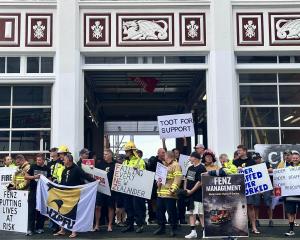
Not just for all that travel in and out of Wellington, but for the inevitable annual series of international gatherings and summits that this country’s prime minister is obliged to attend.
While some dismissively deride such meetings as "junkets" and assume that they are one of the baubles of office, there is very little that is relaxing about attending a multinational meeting.
For a start, it almost always involves two long flights and a dramatic change in time zones.
And once the PM hits the ground they hit it running: their schedule is planned to the minute and it seldom includes time to sample the local nightlife or hive off sightseeing.
What precious few minutes might be in the schedule for leisure are soon consumed by the seemingly inescapable fact that these gatherings seldom run to time, or by the PM trying to secure the next best thing to a full bi-lateral meeting with a fellow leader, a "pull-aside" chat in a corridor.
There is very little junketing to be done, and in truth there is little glamour or romance about such conclaves either. They are hard work from wheels up to wheels down.
Those dismissive types, after claiming that they are nothing but a jaunt, will then question whether anything of true value actually gets done at them.
To give just one local’ish example which gives the lie to that, in his memoirs former Australian Prime Minister Malcolm Turnbull details his strenuous efforts to preserve Australia’s steel and aluminium export market to the US.
It involved a lot of telephone calls and a lot of meetings, but the key moment was his first meeting with then US President Donald Trump at a summit. Mr Turnbull got in the president’s ear at that meeting, and was able to repeat all the same arguments — which the president could not say had not reached him.

Due to the lengthy interregnum which New Zealand finds itself in post-election, Prime Minister-elect Christopher Luxon has already had to miss one international summit, last week’s Pacific Islands Forum in the Cook Islands.
This was unfortunate, as this is a meeting which matters. It brings together the countries which are, literally, in New Zealand’s back yard. They supply a decent chunk of our workforce, and it is the destination for a substantial amount of New Zealand’s international aid budget.
The islands matter to New Zealand, for reasons of historic ties, for economic reasons, and because many of us have family ties there. Although his designated, bi-partisan replacements — Gerry Brownlee and Carmel Sepuloni — no doubt served well in his stead, Mr Luxon’s absence was regrettable and may well necessitate a Pacific trip sooner rather than later once he has finally been sworn in.
More problematic is the grave likelihood that Mr Luxon will also miss the Asia-Pacific Economic Co-operation (Apec) forum, scheduled to be held in San Francisco later this week.
Promoting regional trade is the raison d'etre of Apec, and trade is the lifeblood of the New Zealand economy.
The 21 countries of Apec include China, Australia, the United States, Japan, South Korea, Indonesia and Singapore.
Not at all coincidentally that list, in that order, are also New Zealand’s top seven commodity export markets; Thailand, another Apec member, ranks 10th on that list.
New Zealand will still have a strong presence at Apec even if Mr Luxon cannot attend personally: the summit is too critical for maintaining old trade agreements and developing new ones for the country not to send a large delegation.
But Mr Luxon’s presence would have opened doors. You only get to be a new prime minister once, and Mr Luxon being the new kid on the block has the potential to open doors at this Apec which might remain closed in the second or third year of his time in office.
There is no mystery about who the next New Zealand prime minister is going to be, albeit that the required documents are yet to be signed.
If no deal is able to be reached in the next couple of days perhaps this might be a situation where all parties are best to turn a blind eye to that fact and get Mr Luxon to the departure lounge as soon as possible.














